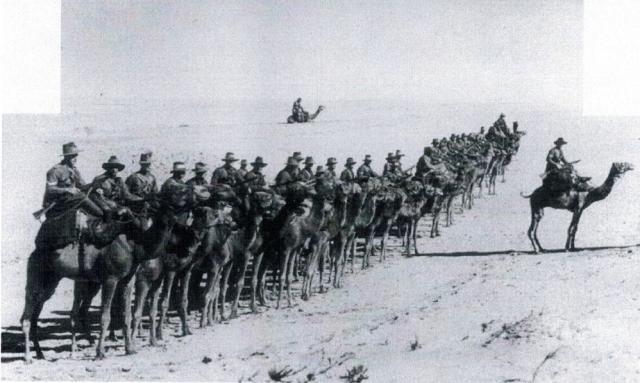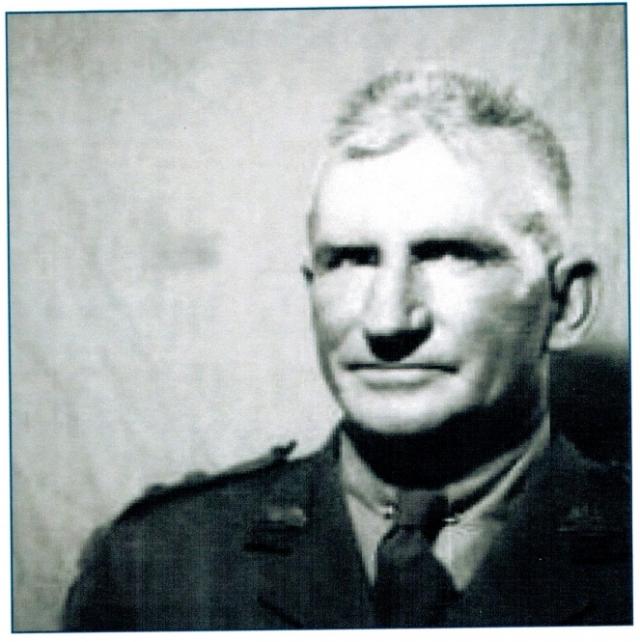The small town of Allora has produced a number of military heroes over the years and this story is to honour the memory of one of them, Bob Brown, who served in both conflicts of World War I and II. Here is Bob’s remarkable story with the famous Camel Corps and later service.
Robert William Brown was born in Allora, Queensland, on 8 February 1894, the sixth child of Robert and Eliza Brown (nee, Cook).
Bob’s life did not begin well as his father passed away when he was only a few months old, so he began life without a father until his mother remarried in 1901.
He grew up in Allora and attended the local primary school for his education and later worked in the mining industry (Acland) up until World War I.
However, his life changed forever when as a 20-year-old, he decided, like many young men of this period, to enlist in the local 14th. Australian Light Horse Regiment in Warwick.
After a short period of around five months with the Light Horse, Robert travelled to Brisbane to enlist in the Australian Expeditionary Force at Enoggera Barracks, Brisbane. He joined up on 22 August 1914 and on 24 September 1914 embarked from Brisbane on board the HT “Star of England” bound for the Gallipoli Peninsula with the 2nd Light Horse Regiment as a Trooper.
The sad thing was that the Light Horse had to see their much-loved horses go on to Egypt without them as the regiment was to fight as infantrymen such was the need for reinforcements at Gallipoli.
Robert, or Bob as he liked to be called, remained at Gallipoli for six months and served in the rather hazardous position of a dispatch rider, which entailed using a horse or motorbike and bravely exposing himself to Turkish snipers that dotted the slopes. He eventually received a gunshot wound on 12 October 1915 and was hospitalised at a Casualty Clearing Station before being transferred to the Convalescent Camp at Heliopolis on 13 November 1915 when the Gallipoli evacuation took place.
It was while recovering from his gunshot wound that Bob learned that he was to be posted to the Imperial Camel Corps as a corporal and to be trained to ride these ‘ships of the desert’ in combat with the Egyptian Expeditionary Force. It was a completely different experience with horses, but Bob appeared to handle the change and was quick to adapt to these ‘foreign’ animals that played an important role in the Light Horse Regiments.
The Camel Corps was raised in Egypt in January 1916 from recruits returning from the Gallipoli campaign and they were active as part of Allenby’s drive to Beersheba and took part in the Sennusi campaign, the Sinai, Romani, Palestine and Magdhaba. They consisted of four companies each of about 130 troops and were active in conducting long-range patrols around the Suez Canal and the Sinai Desert. In the Desert Campaign from 1916 to 1919, 4150 troops and 4800 Camels were used against the Turks.
Bob was promoted to Sergeant and acted as the Company Sergeant Major until granted a commission as a Lieutenant on 9 March 1918, and posted to the Imperial Camel Corps reserve depot. Previously, he had spent time in hospital with a gunshot wound, and on recovery had been sent back to duty in Cairo at the Zeiton Training School.
On 23 March 1918, Bob was transferred from the depot to the Camel Brigade before returning to Australia on board the HT “Wiltshire” and arriving there on 28 January 1919. On 6 October 1919, Bob was honored for his service when he was awarded the Member of the British Empire for his service with the Camel Corps. Here is an extract of Bob’s award:
“The King has been graciously pleased on the occasion of his Majesty’s birthday, to give orders for the following promotion in the appointment to the most excellent Order of the British Empire for valuable service rendered in connection with military operations in Egypt.”
After his discharge, Bob returned to Allora and on 2 April 1919, Bob married Daisy Schubert in Ipswich and on 25 July 1920 welcomed a daughter named Daisy Lilian into the family. He started a small business as a tobacconist with a hairdressing salon and a billiard parlour attached. He later added stationery, and the Golden Casket while his friend Les Masters, ran a barber shop.
However, when the call to arms sounded again in 1939, Bob, again enlisted for service in The Australian Army Reserve and was again granted a commission mainly because of his previous experience. He was called up for service on 12 February 1941, and was posted to the 1st. Garrison Battalion at Warwick as its Commanding Officer and rose to the rank of Captain on 20 October 1943.
The Garrison Battalion was raised with the army reserve for service that included internal security and homeland defense. However, Bob’ service was restricted because of ill health and on 7 March 1943, he was evacuated to the 2/4th Australian General Hospital with bronchial asthma which later, turned into asthma congestive cardiac failure. He was placed on the seriously ill list and declared medically unfit for further duty.
On 28 October 1943 Bob was promoted to Captain and transferred to the retired list. He served for 1128 days. However, sadly, on 19 January 1944 Bob passed away and now lies at rest in Allora cemetery.
Robert William Brown was a true Australian hero and brought great honour to his family and the town of Allora. He was a man among men whose valuable service which resulted in him being awarded the Member of the British Empire is a testament to that and he will always be remembered for his gallant service each Anzac Day in Allora.








